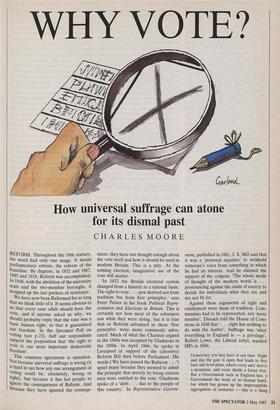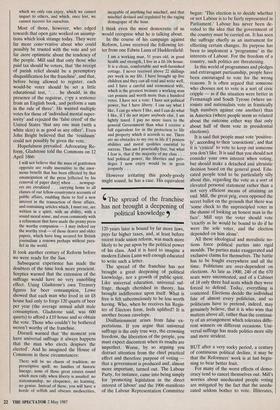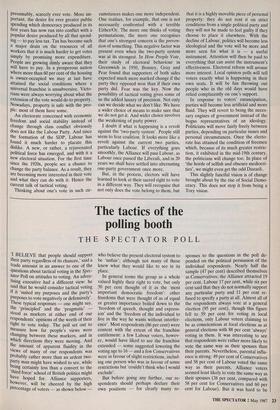WHY VOTE?
How universal suffrage can atone for its dismal past
CHARLES MOORE
REFORM. Throughout the 19th century, the word had only one usage. It meant parliamentary reform, the reform of the franchise. By. degrees, in 1832 and 1867, 1885 and 1918, Reform was accomplished. In 1948, with the abolition of the university seats and the two-member boroughs, it mopped up the last pockets of resistance. We have now been Reformed for so long that we think little of it. It seems obvious to us that every sane adult should have the vote, and if anyone asked us why, we should probably reply that the vote was a basic human right, or that it guaranteed our freedom. In the Spectator Poll on voting (see p.23), half our respondents support the proposition that 'the right to vote is our most important democratic freedom'.
This common agreement is mistaken. Not because universal suffrage is wrong (it is hard to see how any one arrangement of voting could be, absolutely, wrong or right), but because it has led people to Ignore the consequences of Reform. And because they have ignored the consequ- ences, they have not thought enough about the vote itself and how it should be used in modern Britain. This is a pity. At the coming election, imaginative use of the vote will matter.
`In 1832 the British electoral system changed from a historic to a rational basis. The right to vote . . . now derived not from tradition but from first principles,' says Peter Pulzer in his book Political Repre- sentation and Elections in Britain. This is certainly not how most of the reformers saw what they were doing, but it is true that as Reform advanced so these 'first principles' were more commonly advo- cated. Much of what the Chartists argued in the 1840s was accepted by Gladstone in the 1860s. In April 1866, he spoke at Liverpool in support of the (abortive) Reform Bill then before Parliament. His words ('We have passed the Rubicon . . .') upset many because they seemed to admit the principle that merely by being citizens men were entitled to the vote. Gladstone spoke of a 'debt . . . due to the people of this country'. In Representative Govern- merit, published in.1861, J. S. Mill said that it was a 'personal injustice' to withhold someone's voice from something in which he had an interest. And he claimed the support of the zeitgeist: 'The whole mode of thought of the modern world is . . . pronouncing against the claim of society to decide for individuals what they are and are not fit for.'
Against these arguments of right and entitlement were those of tradition. Com- munities had to be represented, not 'mere number'. Disraeli told the House of Com- mons in 1848 that . . right has nothing to do with the matter'. Suffrage was 'what everything in England is — a privilege'. Robert Lowe, the Liberal rebel, warned MPs in 1866:
Democracy you may have at any time. Night and day the gate is open that leads to that bare and level plain, where every ants' nest is a mountain, and every thistle a forest tree. But a Government such as England has, a Government the work of no human hand, but which has grown up the imperceptible aggregation of centuries — this is a thing which we only can enjoy, which we cannot impart to others, and which, once lost, we cannot recover for ourselves.
Most of those, however, who edged towards that open gate worked on assump- tions which look strange today. They were far more cons,Tvative about who could possibly be trusted with the vote and yet far more optimistic about the tendency of the people. Mill said that only those who paid tax should be voters, that 'the receipt of parish relief should be a peremptory disqualification for the franchise', and that, before being allowed to register, each would-be voter should be set a little educational test, ‘. . . he should, in the presence of the registrar, c^py a sentence from an English book, and perform a sum in the rule of three'. He wanted multiple votes for those of 'individual mental super- iority' and rejected the 'false creed' of the United States 'that any one man (with a white skin) is as good as any other'. Even John Bright believed that the 'residuum' could not possibly be given the vote.
Hopefulness prevailed. Advocating Re- form, Gladstone told the Commons on 12 April 1866: I will not believe that the mass of gentlemen opposite are really insensitive to the enor- mous benefit that has been effected by that emancipation of the press [effected by his removal of paper duty] when . . . newspap- ers are circulated . . . carrying home to all classes of our fellow-countrymen accounts of public affairs, enabling them to feel a new interest in the transaction of those affairs, and containing articles which, I must say, arc written in a spirit, with an ability, with a sound moral sense, and even commonly with a refinement that have made the penny press the worthy companion — I may indeed say the worthy rival — of those dearer and older papers, which have long secured for British journalism a renown perhaps without para- llel in the world.
It took another century of Reform before we were ready for the Sun.
Subsequent experience has made the doubters of the time look more prescient. Sceptics warned that the extension of the suffrage would have no very ennobling effect. Using Gladstone's own Treasury figures for beer consumption, Lowe showed that each man who lived in an £8 house had only to forgo 120 quarts of beer per year (the average annual adult male consumption, Gladstone said, was 600 quarts) to afford a £10 house and so obtain the vote. Those who couldn't be bothered weren't worthy of the franchise.
Disraeli warned that 'the moment you have universal suffrage it always happens that the man who elects despises the elected'. And he imagined the House of Commons in these circumstances:
There will be no charm of tradition; no prescriptive spell; no families of historic lineage; none of those great estates round which men rally when liberty is assailed: no statesmanship, no eloquence, no learning, no genius. Instead of these, you will have a horde of selfish and obscure mediocrities, incapable of anything but mischief, and that mischief devised and regulated by the raging demagogue of the hour.
I think even the most democratic of us would recognise what he is talking about.
In the course of his campaign against Reform, Lowe received the following let- ter from one Edwin Lunn of Huddersfield: I am a working man, 51 years old, in good health and strength, I live in a £6.10s house. It is a clean, comfortable and well-furnished cottage. I never received above 22 shillings per week in my life. I have brought up five children and they can all read and write well, and I have a careful and economical wife, which is the greatest treasure a working man can possess and worth more than a hundred votes. I have not a vote: I have not political power, but I have liberty. I can say what I like, I can go where I like, and I can do what I like, if I do not injure anybody else. I am lightly taxed. I pay no more taxes to the general Government than what I receive a full equivalent for in the protection to life and property which it accords to me. There are no obstacles to my rise in life if I possess abilities and moral qualities essential to success. Thus am I practically free, but what I fear is, that if the majority of my class . . had political power, the liberties and priv- ileges I now enjoy would be in great jeopardy . . .
However irritating this goody-goody might sound, he has a case. His equivalent
The spread of the franchise has not brought a deepening of political knowledge
120 years later is bound by far more laws, pays far higher taxes, and, at least before recent trade union reform, was much more likely to be put upon by the political power of his class. And it is hard to imagine a modern Edwin Lunn well enough educated to write such a letter.
The spread of the franchise has not brought a great deepening of political knowledge, nor a growth of public spirit. Like universal education, universal suf- frage, though cherished in theory, has brought indifference upon itself. What is free is felt subconsciously to be less worth having. Who, when he receives his Regis- ter of Electors form, feels uplifted? It is another brown envelope.
Disillusionment arises from false ex- pectations. If you argue that universal suffrage is the only true way, the crowning freedom, the liberation of the people, you must expect discontent when its results are imperfect. Worse, by so arguing you distract attention from the chief practical effect and therefore purpose of voting — that a government is produced and, almost more important, turned out. The Labour Party, for instance, came into being simply for 'promoting legislation in the direct interest of labour' and the 1906 manifesto of the Labour Representation Committee began: `This election is to decide whether or not Labour is to be fairly represented in Parliament.' Labour has never been de- voted to the idea that the government of the country must be carried on. It has seen the suffrage chiefly as an instrument for effecting certain changes. Its purpose has been to implement a 'programme' in the interests of Labour. For the freedom of a country, such politics are threatening.
In this world of programmes and pledges and extravagant partisanship, people have been encouraged to vote for the wrong reasons. It is often argued that someone who chooses not to vote is a sort of civic cripple — as if the situation were better in Fermanagh and South Tyrone (where un- ionists and nationalists vote in frantically high numbers against one another) than in America (where people seem so relaxed about the outcome either way that only about half of them vote in presidential elections).
It is said that people must vote 'positive- ly', according to their 'convictions', and that it is `cynical' to vote to keep out someone you don't like. It is said that you should not consider your own interest when voting, but should make a detached and altruistic decision based on the general good. Edu- cated people tend to be particularly silly about this, regarding the vote as a sort of elevated personal statement rather than a not very efficient means of attaining an end. Mill, the great prig, even opposed the secret ballot on the grounds that there was `some check to the unprincipled voter in the shame of looking an honest man in the face'. Mill says the voter should vote `exactly as he would be bound to do if he were the sole voter, and the election depended on him alone'.
All these ideological and moralistic no- tions force political parties into rigid moulds. The parties make exaggerated and exclusive claims for themselves. The battle has to be fought everywhere and all the time. Politicians are over-dependent on elections. As late as 1900, 240 of the 670 seats were uncontested, and of a Cabinet of 18 only three had seats which they were forced to defend. Today, everything is contested. Elections decide the individual fate of almost every politician, and so politicians have to pretend, indeed, may genuinely believe, that it is who wins that matters above all, rather than the continui- ty of an arrangement which tolerates diffe- rent winners on different occasions. Uni- versal suffrage has made politics more silly and more strident.
BUT after a very rocky period, a century of continuous political decline, it may be that the Reformers' work is at last begin- ning to bear better fruit.
For many of the worst effects of demo- cracy tend to cancel themselves out. Mill's worries about uneducated people voting are mitigated by the fact that the unedu- cated seldom bother to vote. Illiterates, presumably, scarcely ever vote. More im- portant, the desire for ever greater public spending which democracy produced in its first years has now run into conflict with a Popular desire produced by all that spend- ing — to pay less tax. Tax has become such a major drain on the resources of all workers that it is much harder to get votes simply by promising more expenditure. People are growing dimly aware that they will have to pay. In a prosperous nation where more than 60 per cent of the housing Is owner-occupied we may at last have attained the social conditions where a universal franchise is unsubversive. Victo- rians were always worrying about what the extension of the vote would do to property. Nowadays, property is safe with the peo- ple: most of them have some.
An electorate concerned with economic freedom and social stability instead of change through class conflict obviously does not like the Labour Party. And since the formation of the SDP, Labour has found it much harder to placate this dislike. A new, or rather, a rejuvenated political force has emerged, and with it a new electoral situation. For the first time since the 1920s, people see a chance to change the party balance. As a result, they are becoming more interested in their vote and what they can do with it. Hence the current talk of tactical voting. Thinking about one's vote in such cir- cumstances makes one more independent. One realises, for example, that one is not necessarily confronted with a terrible Either/Or. The more one thinks of voting permutations, the more one recognises that one's strongest concern is the preven- tion of something. This negative factor was present even when the two-party system was at its strongest. In How People Vote, their study of electoral behaviour in Greenwich in 1950, Benney, Gray and Pear found that supporters of both sides expected much more marked change if the party they opposed won than if their own party did. Fear was the key. Now the possibility of tactical voting gives some of us the added luxury of precision. Not only can we decide what we don't like. We have a wider choice of means to make sure that we do not get it. And wider choice involves the weakening of party power.
I doubt if what is happening is a revolt against the 'two-party system'. People still seem to fear coalition. It looks more like a revolt against the current two parties, particularly Labour. If everything goes smoothly, the Alliance will pass Labour, as Labour once passed the Liberals, and in 20 years we shall have settled into alternating one-party government once more.
But, in the process, electors will have learned to look at their sacred right to vote in a different way. They will recognise that not only does the vote belong to them, but that it is a highly movable piece of personal property: they do not rent it on strict conditions from a single political party and they will not be made to feel guilty if they choose to place it elsewhere. With the decline of Labour, politics will become less ideological and the vote will be more and more seen for what it is — a useful instrument. Attention will then be paid to everything that can assist the instrument's effectiveness. Electoral reform will arouse more interest. Local opinion polls will tell voters exactly what is happening in their own seats. It will be fun throwing out people who in the old days would have relied complacently on one's support.
In response to voters' emancipation, parties will become less artificial and more fluid. They will revert to being the neces- sary engines of government instead of the bogus representatives of an ideology. Politicians will move fairly freely between parties, depending on particular issues and personal circumstances. Once the electo- rate has attained the condition of freemen which, because of its much greater restric- tion, it exhibited in the mid-19th century, the politicians will change too. In place of `the horde of selfish and obscure mediocri- ties', we might even get the odd Disraeli .
This slightly fanciful vision is of change brought about by the rise of Social Demo- cracy. This does not stop it from being a Tory vision.




















































 Previous page
Previous page